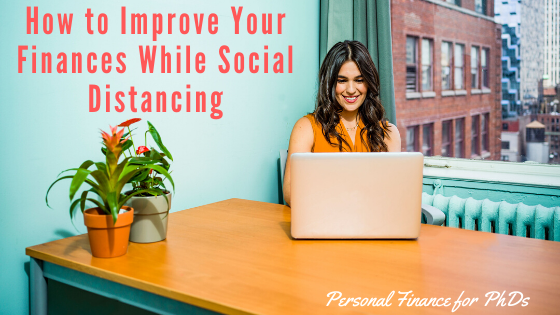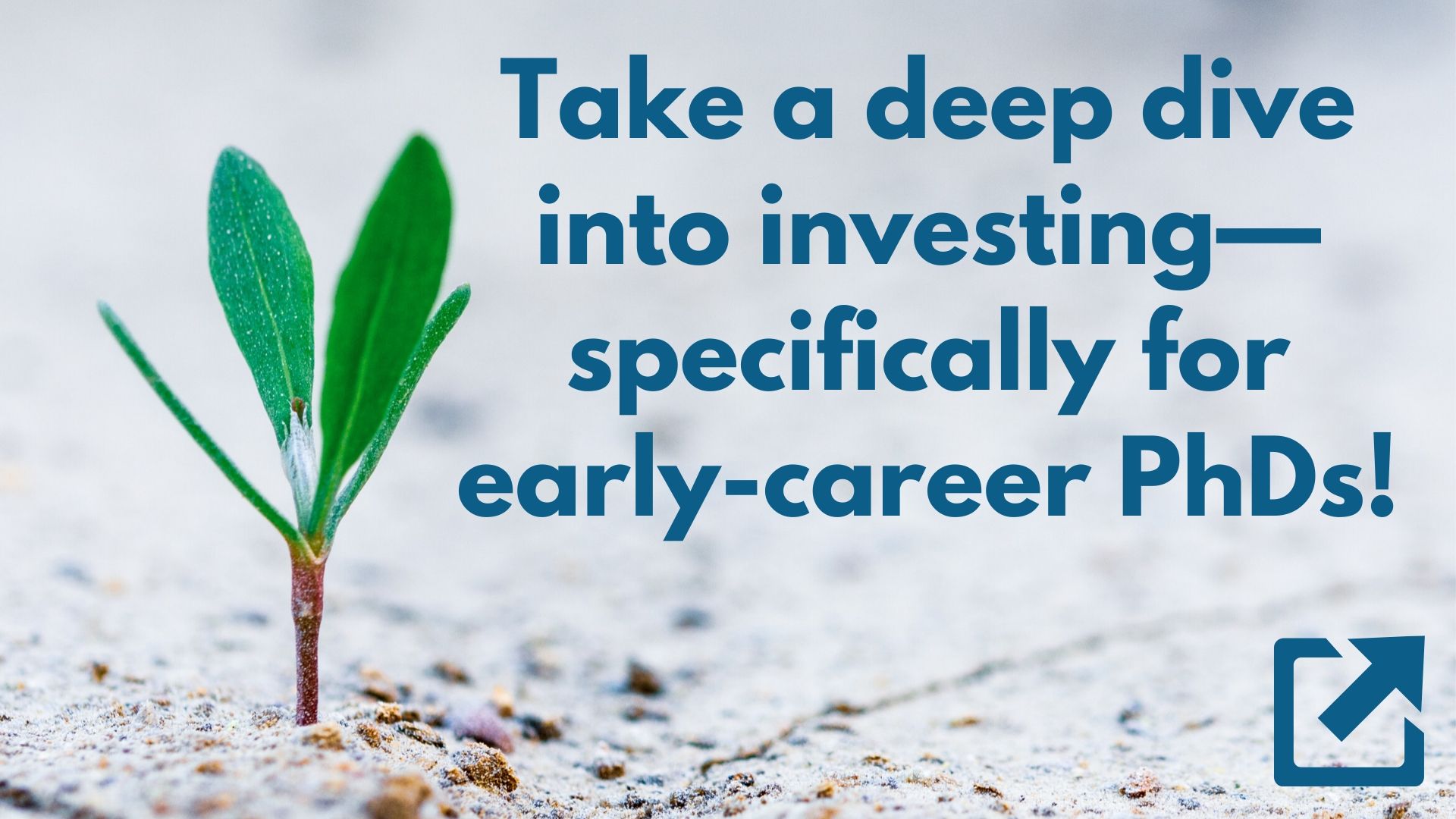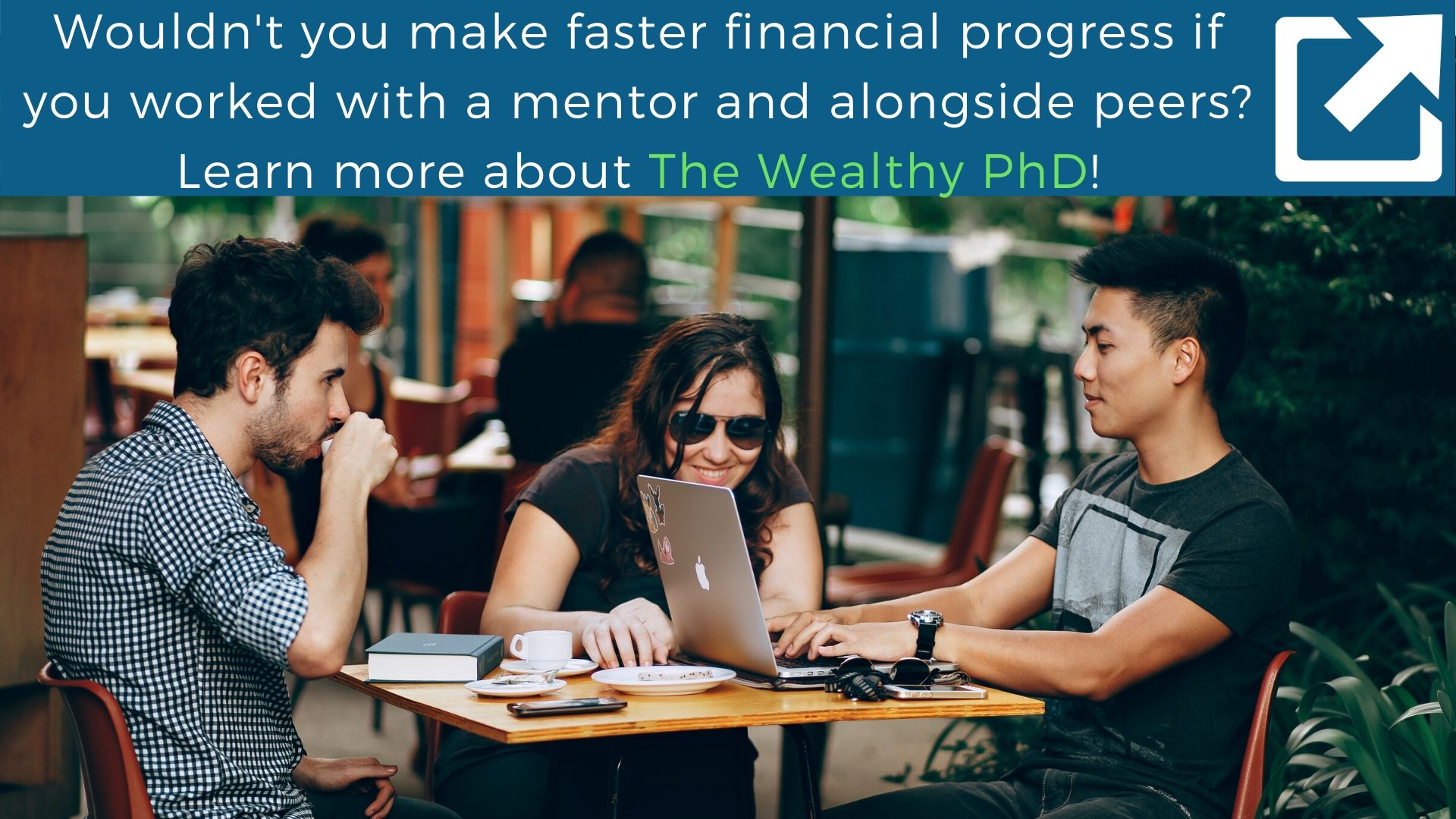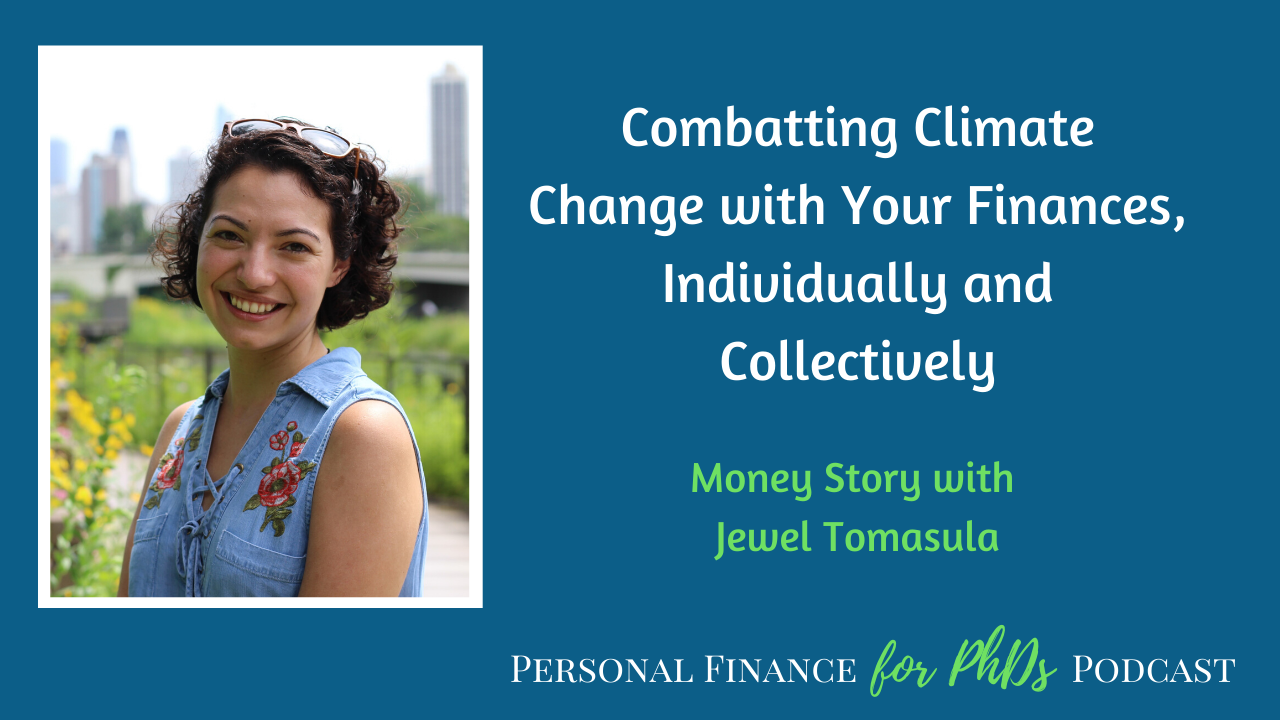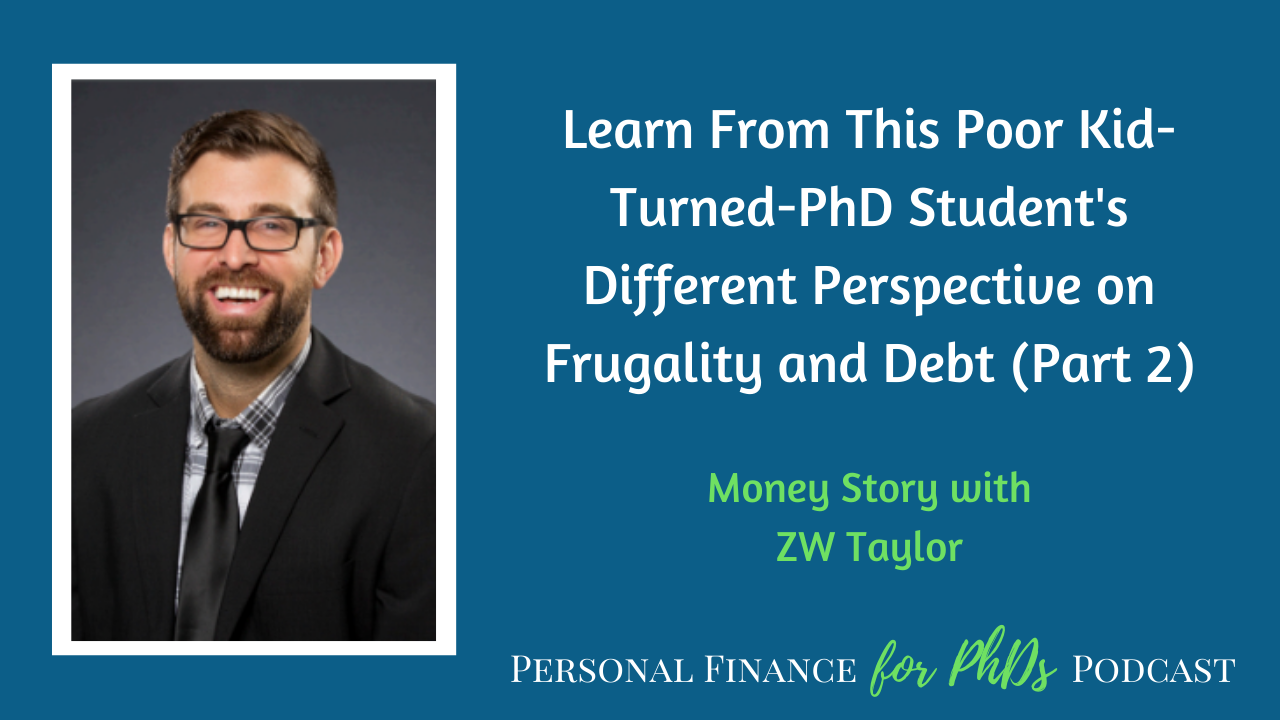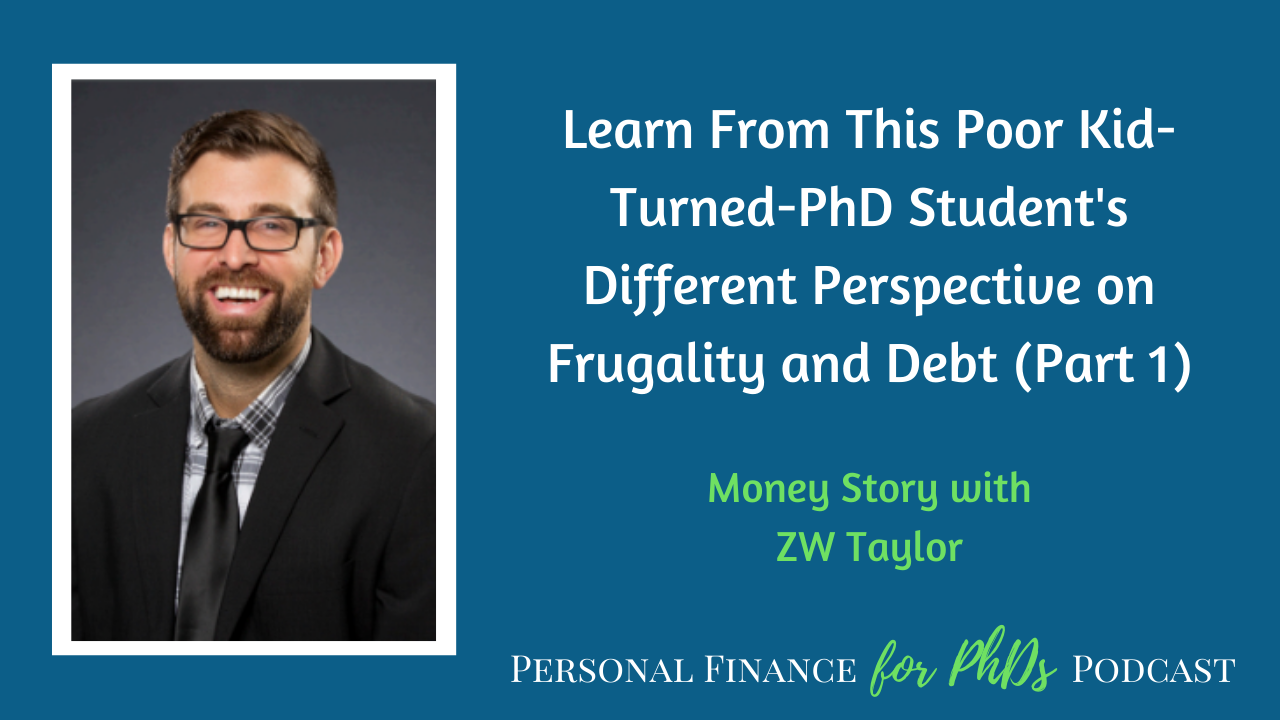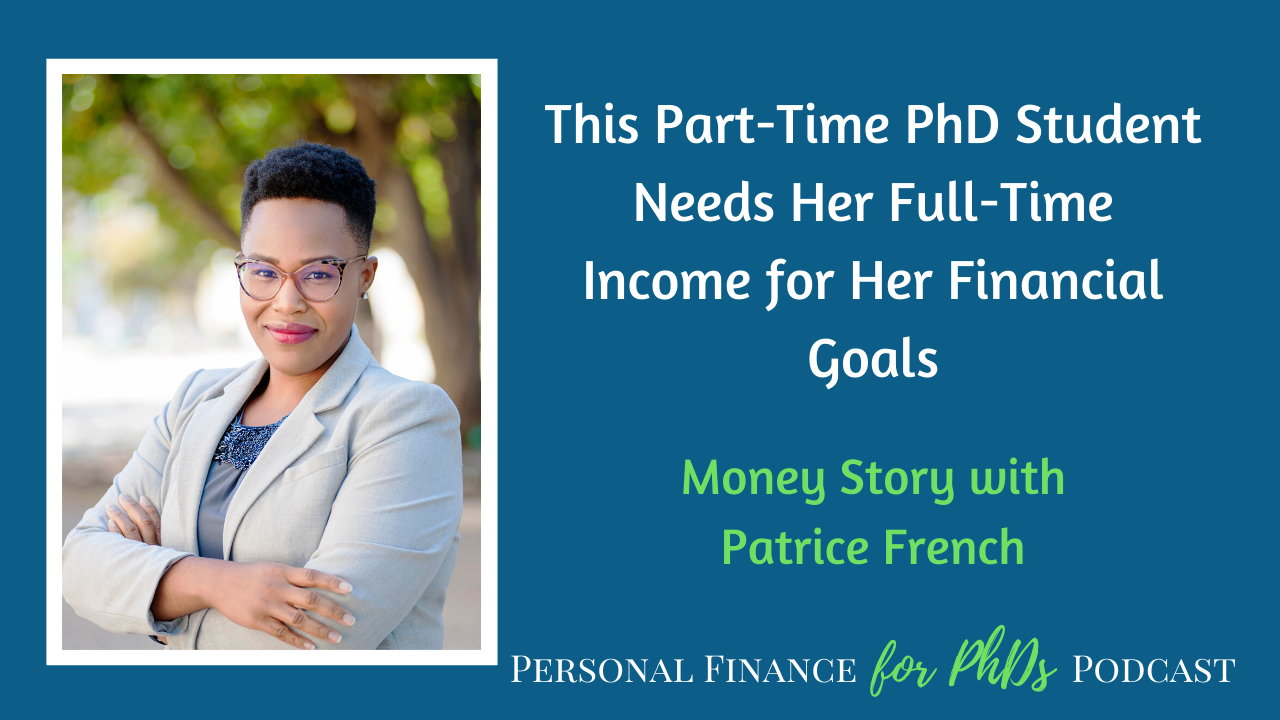In this episode, Emily interview Dr. Sean Sanders, Director and Senior Editor for Custom Publishing for the journal Science and Program Director for Outreach. Sean came to the US for a postdoc position with little savings. Living in the DC area on a postdoc salary was financially challenging; he didn’t start to make real progress with his finances until he left his postdoc for an industry job, which more than doubled his salary. Sean and Emily discuss the strategies he has used to build wealth in the last decade, from moving to reduce housing expenses to retirement investing to purchasing real estate. They go into great detail about Sean’s passive investing strategy and the mistakes he made in the past. Sean lists his favorite books and podcasts on personal finance that he has used to improve his knowledge over the years.
This is post contains affiliate links. Thank you for supporting PF for PhDs!
Links Mentioned
- Find Dr. Sean Sanders on LinkedIn
- Fiscal Fitness for Scientists
- The Stock Series by JL Collins
- The Simple Path to Wealth by JL Collins
- A Random Walk down Wall Street by Burton Malkiel
- The Four Pillars of Investing by William Bernstein
- The Seven Habits of Highly Effective People by Stephen Covey
- Afford Anything Podcast
- Financial Independence Podcast with the Mad Fientist
- The White Coat Investor Podcast
- Planet Money from NPR
- The Indicator Podcast
- ChooseFI Podcast
- So Money Podcast
- Personal Finance for PhDs: Financial Coaching
- Personal Finance for PhDs: Podcast Hub
- Personal Finance for PhDs: Subscribe to the mailing list
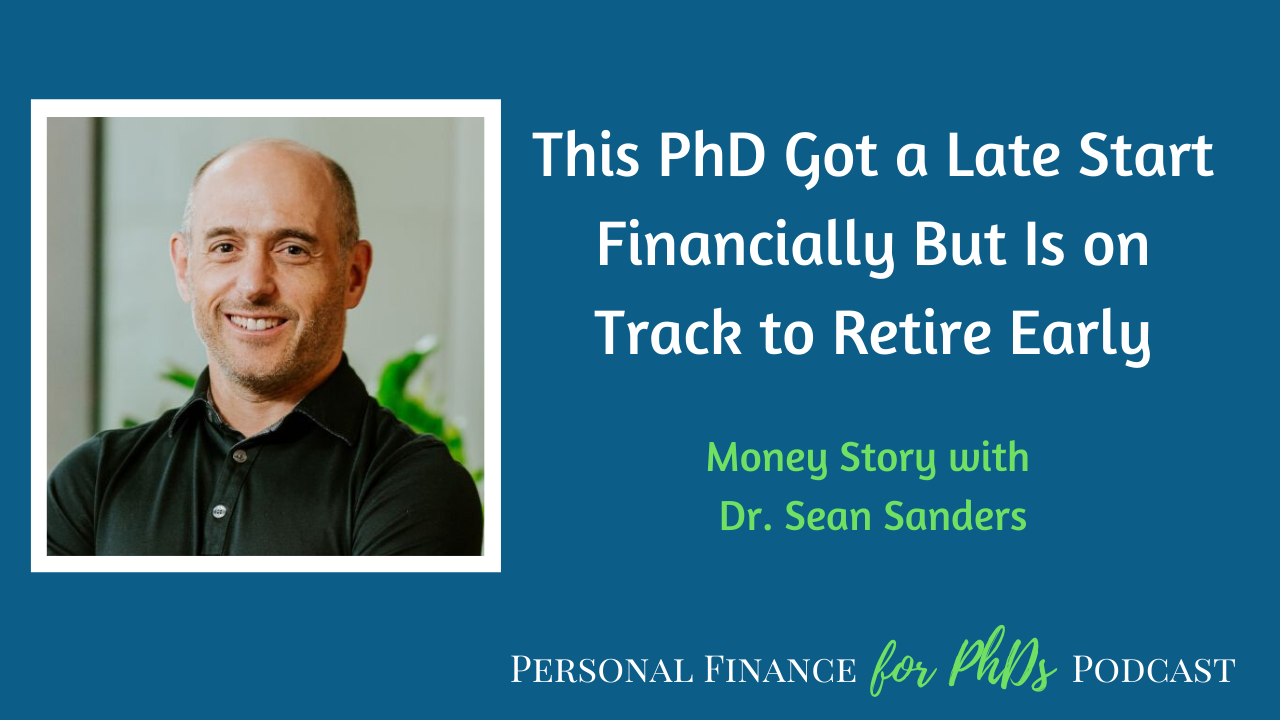
Teaser
00:00 Sean: When I was thinking about being a scientist, I always had the impression that scientists are poor. We never make money, and that you did research because you loved it. You know, when I moved over to the USA, I really didn’t have much in savings, so I didn’t really think about it very much. I had to learn from scratch once I moved to the US and once I had a little bit of income to invest, that’s really when I started thinking about what I wanted to do with it.
Introduction
00:33 Emily: Welcome to the Personal Finance for PhDs podcast, a higher education in personal finance. I’m your host, Dr. Emily Roberts. This is season six, episode eight, and today my guest is Dr. Sean Sanders, director and senior editor for custom publishing for the journal Science and program director for outreach. Sean came to the US for a postdoc position with little savings. Living in the DC area on a postdoc salary was financially challenging. He didn’t start to make real progress with his finances until he left his postdoc for an industry job, which more than doubled his salary. Sean and I discuss the strategies. He is used to build wealth in the last decade or so, from moving to reduce housing expenses, to retirement investing, to purchasing real estate. We have a particularly involved and enjoyable discussion of Sean’s passive investing strategy and the mistakes he made in the past. We also swap recommendations of personal finance websites, books, and podcasts. Sean is now on track to retire early, and I’m sure his story will give hope to other PhDs who have, or will enter their thirties without any appreciable savings. Without further ado, here’s my interview with Dr. Sean Sanders.
Will You Please Introduce Yourself Further?
01:50 Emily: I’m delighted to have joining me on the podcast today, Dr. Sean Sanders. Sean works for AAAS and actually we met recently and did an event together at the end of 2019, Fiscal Fitness for Scientists. We’ll link it up from the show notes is a great event that Sean moderated and I was part of the panel. That’s how we first connected, but as we talked more and more at that event, I realized that Sean has an amazing story of his own to tell with respect to his own personal finances, so that’s what we’re going to be discussing today. Sort of how his career has evolved and also his finances, alongside those. Sean it’s really a pleasure to have you joining me here, and will you please introduce yourself further for the audience?
02:29 Sean: Hi, Emily. Thank you so much for inviting me, for the opportunity to talk to your audience. It really is a great pleasure for me to be here. I think we had some fantastic conversations when we met and I’m so pleased to share a little bit more of my story. I’m currently the director and senior editor for custom publishing at Science, here in Washington, DC. I’ve been in this position about 13 years now, but I actually started out as a research scientist. To give you a very overview of my career arc is I started my studies in South Africa. I grew up in Cape Town. I did my undergrad at the University of Cape Town. I then did a one year what we call an honors degree, which is equivalent to a one year masters. I took a break for a while and then I did a PhD actually at University of Cambridge in the UK. I was very fortunate to get in there. Following that, I moved over to the US to do a postdoc at national institutes of health, doing cancer research. I then moved on to a second postdoc at Georgetown University. I was there for about a year and a half, and then a few things happened, which we’ll probably get into a little bit later in the podcast, and I ended up moving into industry, into a small biotech company where I was for about three and a half years. Then got laid off from that, and that’s another story in itself. Then I moved into publishing and I joined the journal BioTechniques for a couple of years. Then, I finally got an offer at Science and I’ve been here for 13 years now. It’s quite a convoluted journey, but it’s been really interesting. And obviously I’ve learned a lot of things along the way.
Early Career Money Mindset
04:09 Emily: Yeah, love it. We’ll be hearing about a few of those as we go forward. Going back to your days in training during your PhD and your postdoc, was your plan to stay in academia and that changed during that second post doc. And then alongside that, with your plan to be in academia, how were you handling your finances at that time? And what was your view of finances generally?
04:29 Sean: When I was thinking about being a scientist, I always had the impression that scientists are poor. We never make money and that you did research because you loved it. And that’s what I wanted to do. I really had just a great passion for research. I really enjoyed investigating. So that’s what I wanted to do. When I was doing my undergraduate, I didn’t really think about finances. I didn’t have much money, even when I moved over to the US I, I really didn’t have much in savings. I didn’t really think about it very much. I had to learn from scratch once I moved to the US and once I had a little bit of income to invest, that’s really when I started thinking about what I wanted to do with it.
05:15 Emily: You’re referencing your move to the US, is that a thing in and of itself, your move to the US, or is it more that you were just advancing in your career and it was a later stage and you were earning more money?
05:26 Sean: I think it was a little bit of both. I was a student through the time that I was in the UK at Cambridge University. As a student, I had a very generous scholarship from the Welcome trust, and I actually managed to save a little bit of money to bring over to the US, but it wasn’t more than a few thousand dollars, so I really was starting from scratch. I didn’t have any income to save and at that point, I didn’t even know what a retirement account was.
05:54 Emily: Yeah. I mean, the transition to the US also comes getting used to a whole other financial system, which I think we’ll talk about more in a moment. So your view was that scientists are always poor. That was your plan. Did you think that would even be the case once you got the tenure track job? You just really thought that was going to be your whole life?
06:13 Sean: Yeah. I didn’t think that scientists earned more than like $70,0000 or $80,000. And, you did it for the love of it. You were working off grants, so you never really made a lot of money. I didn’t ever think that I would be able to retire any time before 65, 70.
Changes in Finances Leads to Changes in Money Mindset
06:31 Emily: Got it. But you mentioned earlier that sometime during your second postdoc, something happened, something changed. Can you tell that story please?
06:38 Sean: Sure. As I said, I was at NIH for about three and a half years, and then I moved to Georgetown University. One thing that I should share with everyone is coming from South Africa, when I moved to NIH, I was on a J-1 visa. I’m not sure if your audience are familiar with this, some probably are, but it’s a training visa. While you’re on a training visa, you’re essentially like a student. You don’t pay taxes like a worker does, and you don’t pay social security. You don’t pay Medicare. Any of that. Now, the advantage of that is there’s more money in your pocket. The disadvantage is you don’t have that social safety net. When I moved to Georgetown University, I got into an H visa, which is what I wanted, because that’s a working visa and enabled me to stay in the country for longer and also progress to a green card, which I eventually did. But what comes along with that is all these other taxes. I had to pay federal tax. I had to pay state tax. I even had to pay county tax in Montgomery County, which was a huge surprise. When I was thinking about this job and looking at the finances and seeing what they would pay me, I didn’t even think about all these additional taxes and I didn’t do my due diligence, and that really came back to bite me.
07:53 Emily: I want to add in there that this is not even necessarily a story that’s unique to someone switching visa types or anything, or becoming a resident. This is something that can happen. I think even moving from graduate school to the postdoc level, or postdoc to another type of job. The reason is not regarding income tax, but regarding payroll tax. As graduate students, generally speaking students, don’t pay payroll ta, that is for social security and Medicare. They have a student exemption. Also anyone who’s not receiving wages, so anyone on fellowship, non W2, they also aren’t paying payroll tax. So getting out of those kinds of training stages, that payroll tax can be, it’s like 7.65% on the employee side, so if you weren’t expecting that, it can be a shock. For you the shock was bigger, because it is not only payroll, but it’s also income taxes and other things, but just wanted to point out like other people need a little heads up about this as well.
08:45 Sean: Right. I wasn’t completely ignorant to the federal taxes I’d had have to pay, but it was just everything at the same time. On top of that, I found out that I had to pay for parking on campus, which I didn’t know about and that was an extra hundred dollars a month or something. All of these things sort of piled on top of each other and then I’d been there for about a year and I read a story in the local paper about what garbage collectors or sanitation engineers, I guess they call them, were being paid, and it was actually a couple of thousand dollars more than I was being paid as a postdoc. Not to take anything away from any kind of employment, it’s all honest work, but I felt that with all the work that I put in to get these higher degrees, I really wasn’t doing myself any justice by being in a position where I wasn’t getting paid, what I thought I was worth.
09:39 Sean: I made a decision at that point to start looking around and I started doing a search for a job in industry, and I was very fortunate to find something up in Massachusetts. The thing is it’s something that probably affects a lot of your listeners is that you can’t always make easy moves, geographically. Some people have families, they have kids, they have spouses. I was in the fortunate position that I could, so I looked very broadly around the country. I looked on the West Coast, I looked up in New England, and I found a great position in Massachusetts, and almost instantaneously I’m more than doubled my salary. I’ve heard of some people calling this geographic arbitrage where you’re willing to move to a different place for our highest salary, and that’s what I did. And although I didn’t love living in Massachusetts, the snow was horrendous, but it was worthwhile for me, and it really set me off on a new financial path, where I could actually save some money and invest in my future.
Making Lifestyle Changes to Increase Savings
10:38 Emily: Yeah. Please elaborate on that. What were the changes that you started making in that time with the higher salary?
10:45 Sean: Well, I think probably the biggest thing was just starting to put away money in savings. As I’m sure you’ve talked about, the first thing I did is I started an emergency fund. I brought up about three months of savings. I also put money into my company’s 401k, immediately. It was as soon as I could, I think it was six months before I could vest. There were also some stock options, which ended up not being worth anything because the company to go under, but it was, it was things that I needed to think about and learn.
11:18 Sean: I started really focusing on living below my means because actually when I was at Georgetown University, I actually found that from the numbers that I looked at, I was actually losing money. So I was spending more than I was earning. Part of that was living in Montgomery County, which was expensive.
11:37 Emily: If you don’t mind, just how were you financing that. If you were actually losing money, was it savings previously built up that you’re drawing down or were you accumulating consumer net?
11:47 Sean: No, it wasn’t debt. I just couldn’t come out on what I was earning. At the time was paying about $800 or $900 a month in rent and that was about 40% or 50% of my income. I didn’t go out that much, but you want a little bit of spending money and I was paying all these other things. I was paying for parking. And I was managing to save a little bit, but really not much. It just made it clear to me that I needed to find some way to focus a bit more on my financial future and get the kind of position where I could actually save and have something in retirement.
12:27 Emily: Yeah. One thing that I discuss during the seminars that I give at universities, one of the points I try to make is that there’s a lot that you can do within your finances while in training, regarding frugality and finding the low rent place to live or what have you. But ultimately, the best thing you can do for your career is to finish that training, be out of graduate school, be out of the post doc, and get that your full salary. The point that I’m trying to make is, although I love to talk about frugal strategies and I love to talk about side hustling and all that stuff, none of that should distract you from just progressing in your career and moving on and getting that higher salary. When you did that, when you achieved that, and you decided, okay, we’re ending this postdoc, I’m getting another type of position, you said that you were focusing on living beneath your means, but I wonder how that compared to your lifestyle when you were at Georgetown. When you got the new job, did you consciously increase your lifestyle in any way, yet still live beneath your means, or were you trying to keep it pretty much feeling like you had during your postdoc?
13:30 Sean: No, I was very focused on saving as much as I could because, at that point I was in my thirties already and I really had very little savings to speak of, and I knew that I really had to start doing something, because I didn’t want to reach 35 or 40 and not have any savings. I’ve always focused on living beneath my means. I can tell you, just an interesting story. When I was up in Massachusetts, I had a coworker who I remember was talking about leasing a car with her husband, and they turned in their previous car. They were paying something like $500 a month or something exorbitant like that. They turned in the car and they could’ve got a cheaper car, but instead they got a better car, a fancier car for the same payment. And that made absolutely no sense to me. Why wouldn’t you get the same car or similar car that’s cheaper and pay $350 a month. That was a mentality that I never understood and I didn’t want to fall into that trap. The way I looked at it is I’m going to get the cheapest car I can. I buy a second hand car, drive it into the ground. I’m going to spend as little as possible on rent. And in fact, what I did is I moved three times in five years while I was up in Massachusetts, both to get closer to work, so my commute was shorter, but also to save on rent. The one move that I made was into a new condo unit that had just been refurbished and they were giving a special for the year and two months of free rent. I stayed there for the year and then I moved. Again, if you’re able to do something like that, you can save quite a lot of money. And I mean, it probably saved me about $5,000.
15:08 Emily: Yeah. This is a strategy that I also try to mention because it’s one I used during graduate school. For example, I moved a couple of times specifically because okay, our rent is increasing, we know what else is around, that’s available. Can you talk about how you actually executed that though? Because it is a really daunting thing to both research a new place to live and then actually execute the move, and it can be expensive too. How did you do this, and still come out ahead financially?
15:32 Sean: As far as moving, you just got to have very patient friends who are willing to help you move. And I always depended on them. I tapped into my network and I’d hire a U-Haul and throw everything in there and move to the next place. Actually, just to add a little bit to the story, once I I’d been at this company for about three and a half years, the company ran out of funding, we were venture capitalist funded, and I got laid off along with the rest of most of the rest of the business. I decided I’d have to move. I couldn’t afford the apartment that I was in. I moved from a two bedroom apartment to a one bedroom, a little bit away from the main part of the city, so it was cheaper. The commute was a little bit longer, but it was definitely worthwhile. Again, I saved quite a lot of money that way. To your question about how I did it, I would just always be keeping a lookout for new places. Both as I drove around and online, I’d constantly be researching, see if there were any deals. And to this day, I do things like that with for instance, CD rates. I look every couple of months just to see where the certificate of deposit rates are, see if I can get a better deal some way. If there’s a good savings account that I can move my money into, my emergency fund, just to get maybe a half a percent or percent more.
16:55 Emily: Yeah. It sounds like you’re just kind of keeping a pulse on the market. Whatever markets you’re involved in, you’re keeping an eye on it to see if there’s a better deal available.
New Financial Goals
17:03 Emily: Okay, so when you increased your salary, you moved to Boston, eventually, of course, you found yourself back in the DC area, you mentioned using the 401k available to you through work, you mentioned living beneath your means consciously. It sounds like you didn’t have any debt or no significant debt to work on. Were there any other financial goals that you’ve set for yourself, with this higher salary?
17:31 Sean: Not really. I’m not much of a goal setter, and that’s probably one of my downfalls. I don’t have a budget. I feel that I just spend as little as possible. I would do things like I would eat out very seldom. I’d rather get takeout or cook at. I was not married, I didn’t have kids, and I know that definitely adds complications to everyone’s stories. I was very fortunate, from that point of view. And I really just wanted to build up as much savings as I could and put the maximum into whatever retirement funds that I could, just to really build up a nest egg for myself in retirement. And also, my parents were aging at that point and I wanted to make sure that if necessary, I could provide for them.
18:20 Sean: Then the other thing that I had in mind is that I did eventually want to buy a property to live in. That was sort of one of my goals. I wasn’t saving consciously towards that as in, I didn’t set aside a separate bank account and put in money for a down payment, which some people say is a good way to do it, sort of use the bucket mentality. I was thinking about the future, but not in any specific way, but I did know that eventually I wanted to be a homeowner and have a place that I could call my own, that I knew I couldn’t get kicked out of because somebody wanted to raise the rent.
18:57 Emily: And has that happened? Have you purchased a home?
18:59 Sean: I did. When I moved back to Washington to my, my position at Science and AAAS, I decided…well, actually my thought process was, I think you’re old enough now you should get a place of your own, so I bought a condo in an area called Columbia Heights, which is an up and coming area in DC. I was quite strategic in doing that. I wanted an area that had recently been revitalized and that was not too expensive, but that I saw some opportunity. Also DC, as you probably know, is a city that will always have people coming to live there. It’s a huge itinerant population that are coming to work for government, for law firms, et cetera. I thought having a place there would be good because when I eventually upgraded or got married or moved out, I’d be able to rent it. That’s actually what I’m doing. I lived in the unit for eight years and I’ve been renting it now for five years, and basically my rent covers my mortgage payment and the condo fees with a little bit of extra. It’s worked out really well.
20:01 Emily: Nice. Have you bought another property or are you renting again your primary residence?
20:05 Sean: No, I actually, I got married, and I moved into my now wife’s house, up here in Silver Spring. I’m looking to possibly buy another rental property, an investment property, but this area is really, really expensive and you need to find just the right place to make it worthwhile, and it’s really tough. I’ve been looking for over a year now and it’s very difficult.
Commercial
20:34 Emily: Hey, social distancers, Emily here. I hope you’re doing okay. It took a few weeks, but I think I have my bearings about me in my new normal. There is a lot of uncertainty and fear right now about our public and personal health and our economy. I would like to help you feel more secure in your personal finances and plan and prepare for whatever financial future may come. You can schedule a free 15 minute call with me at PFforPhDs.com/coaching to determine if financial coaching with me is right for you at this time, I hope you will reach out, if only to speak with someone new for a few minutes. Take care. Now back to our interview.
Financial Strategies and Advice
21:20 Emily: Okay. Yeah. So I think we’ve gotten a good landscape of the goals that you had — saving cash, using your 401k, buying property, and some of the strategies that you use, but were there any other strategies that you’d like to throw out there for the audience? Anything you’ve tried and found works really well for you?
21:37 Sean: As I mentioned, I’m as frugal as I can be. I try to live below my means and save as much as I can. The other thing that I learned in the last few years is that…Well, let me take a step back. When I moved to the NIH and I started investing, I had a little bit of extra money, I got advice from the banker who was at the local Crest Star branch, which is, I think became SunTrust eventually. There was a little bank at the NIH and he recommended some stocks that I could invest in, some mutual funds, and I didn’t know any better, so I put some money into that, but I learned over the years about what kind of fees are involved, especially with mutual funds.
22:21 Sean: I started reading and listening to podcasts, and my strategy now really is all index fund investing. I invest in ETFs, exchange traded funds. They have very low expense ratios, usually less than 1%, and I have no doubt on your show, you’ve talked about the power of compounding. If you start early and save, by the time you get to retirement, you’ll have a good nest egg. The same applies for expenses, sort of in reverse. If you have very high expenses on your investments, you’re going to lose a lot of that money. I recognized that I had not done my due diligence on the type of funds that I was investing in. There’s a few people that I follow that I’ll maybe mention some of the podcasts that I listened to who talk about index fund investing and how much more efficient it is than investing in especially managed mutual funds, where you’re paying 1%, 2%, sometimes 3% or 4% in the expense ratio.
Investing Strategies and Tips
23:22 Emily: Yeah. I do want to elaborate on that because investing and the specifics, like this, are not something that we talk about on the podcast, as much as I would like to, because I love the subject. Expense ratios, for those who don’t know, it’s just kind of a catch all number representing how expensive it is to own that fund. And basically whatever amount of return you’re getting, you have to subtract those fees, those expenses right off of it. So if over the long-term, you might expect like an 8% average annual rate of return, if you have a 1% fee that you’re paying, it knocks you down to 7%. And while that doesn’t necessarily sound like a lot, like 1% doesn’t necessarily strike you as very high, I’ve seen calculations on this, where it can result in a net worth decrease over the decades of hundreds of thousands of dollars ,for just paying something like a 1% fee, where you could have gotten with an ETF or an index fund, maybe 0.1%, maybe 0.05%, maybe 0% in some cases. So there are much less expensive funds out there, and the expense of owning an actively managed mutual fund is one of the reasons why index funds and ETFs are actually, in the long-term, better investments in the sense that you end up with more money in your pocket, usually, when you invest in those kinds of vehicles, rather than actively managed mutual funds. Expenses are one of the big reasons why that is the case. Do you agree, would you like to elaborate at all?
24:40 Sean: Absolutely. I think we’re singing from the same hymnal. I completely agree and for the scientists out there, as much of your audience is, there is a lot of good research that shows that investing in managed mutual funds is not beneficial to you. You actually end up making less money than if you invest in exchange traded funds. The reason is that the management of the funds will sometimes be good for a few years, but then they always going to have downtimes, and the success of the fund really has very little to do with the manager. There are very few people in this world who actually know how to invest well in the stock market, and maybe just a few people like Warren Buffet and Jack Bogle are ones that maybe it would come to mind. But really for the majority of us, we don’t have the time or the resources to really understand every single stock that we invest in.
25:39 Sean: Just to talk a little bit more about ETFs, essentially what you’re doing with an ETF is similar to a mutual fund, where you are investing in a basket of companies. So instead of just investing in a single stock, so say I buy Amazon or Apple, I invest in the broad market. Say I have a Vanguard total stock market ETF, and that basically encapsulate the entire stock market, and that way it protects you against volatility and risk. You’re not going to make the same returns as if you invested say in Facebook 10 years ago, and now it’s worth 20 times as much as it was, but slow and steady wins the race as far as I’m concerned. You’re not going to lose your pants by investing all your money in a company, or in Bitcoin, or something scary like that.
26:27 Emily: Yeah. Lots of good long-term investing principles and philosophies that we’re throwing out there. Anything more that you’d like to say about investing or other strategies you’ve been using?
26:37 Sean: Maybe I’ll just talk a little bit about some of the other ETFs invest in. I will mention before the end of the podcast, a few resources that I really like. But from the advice that I’ve read, really the methodology that I follow is to get broad market funds. I invest in the total stock markets. Then I have a little bit of money in small cap and medium cap ETFs, or mid cap ETFs. Then I also have some in an international equity ETF, and all of these actually are through Vanguard. I did want to mention this because you did mention that there are some expense ratios that are zero, and there are companies now, including Vanguard and Fidelity that are offering some of their ETFs at a zero expense ratio, which is fantastic. And a lot of them also offer free investing so that there’s no charge to purchase these ETFs, and I think that’s a great deal.
27:37 Sean: Then the other two areas of the market that I do invest in are a total bond market ETF, as well as a REIT which is a real estate investment ETF. Basically, it’s very similar to the other ETFs that invest in companies that are invested in real real estate. And the reason I do that is just to diversify. Generally, REITs don’t move with as much volatility as the rest of the markets, so they’re a little bit more stable, but they’re not quite as as low return as bonds are. They’re kind of between stocks and bonds. I have it a little bit, maybe about 10 or 15% of my portfolio in that.
29:19 Emily: I think what you’re describing, it might for the uninitiated listener, sound a little bit complicated. You’ve thrown out maybe five, half a dozen different ETFs you’re invested in, but to my ear, what this is, is a well diversified and an appropriate asset allocation for you and your investing goals. And you need a few different ones of these buckets to make those two things happen. But the actual investments that you’re in are all in themselves well-diversified and across market sectors. You are not for example, picking individual stocks. As you mentioned, you had done that in the past, or your advisor was telling you how to do that in the past. You’re also not picking market sectors. I didn’t hear you say, Oh, well, I’m invested in a special biotech ETF, or a special some other one. You’re going for something that’s representative of full market sectors. You are really avoiding the kind of psychological traps that we can easily fall into around investing, of thinking we know where the market’s going or one segment of the market, so I appreciate that approach. Are those kinds of things that you’ve done in the past and that you’ve learned from and changed your approach, or did you avoid some of those pitfalls entirely?
29:23 Sean: I think it’s been an evolution over the years that I’ve sort of moved more and more towards ETFs as I’ve become more comfortable with them. Really, I went from investing in individual stocks to investing in mutual funds and then into ETFs. I did want to make the point though, that I don’t want to tell you shouldn’t invest in individual funds or in more narrow market ETFs, but just do your due diligence. And also, one of my mantras is I don’t invest money that I can’t afford to lose. If there is money that I need say in the next couple of years, that is not money that’s going to be in the stock market. I’m investing long-term. In fact, in my investment account, I’ve sold very few of my stocks. I’ve sold some of the original ones that were high expense ratios and some of the individual stocks, but I really haven’t sold much except to rebalance. I’m investing for the long-term. I’m putting money in, I’m not taking much money out. If you think you’re going to need to buy a house in the next five years, that money shouldn’t be in the stock market, that should be in something safer.
30:30 Emily: Yeah, I totally agree with you. You mentioned earlier using your 401k — are all of your investments inside that 401k, or do you use other kinds of vehicles as well, like an IRA or a taxable investment account?
30:42 Sean: I try to max out my 401k. I actually have a 403b, which is essentially the nonprofit version of a 401k because I work for a nonprofit, AAAA. I do also put as much money as I can, as I’m allowed, into a traditional IRA. There’s also a Roth IRA that’s available to some people. There is a cap on your income where you can no longer invest in a Roth IRA, but if you are able to I’d recommend that as well. And then I also have just a straight brokerage account where I put in after tax money. Anything that’s left over goes into that.
31:24 Emily: I do want to mention, because this is a conversation about investing, at least it’s part of it, that earlier, 2019 and prior, graduate students and postdocs who are on fellowship, who did not have W-2 income, they were not able to contribute that non-W-2 fellowship income to IRAs, but starting in 2020, that law has changed and you are now able to contribute non-W-2 fellowship income to IRA. So anyone who had learned about that old system, but hadn’t yet heard about the update, I want to throw that out there for them, that you are able to now use that kind of vehicle, even if you have non-W-2 fellowship would come during graduate school or your post doc.
32:01 Sean: That is great news.
Financial Literacy Resources
32:03 Emily: What we’ve come to, I think is kind of a very…I don’t necessarily want to see sophisticated because it’s also simple, but a well-tuned practice of your personal finances. You’ve mentioned a couple of times, maybe you can take a little bit more time now to say, how did you actually come to this point? How did you learn about all these different strategies and start to implement them? Because it’s not something that many of us would get from our mother’s knee, for example.
32:33 Sean: When I moved to this country, I was very fortunate to meet somebody who already worked at the NIH, who kind set me on the right path. His name is Chi Kang and he’s still a good friend of mine. We’ve known each other for more years than I can count. He gave me some really great advice to start off. One that I remember is as soon as you come to the country, start building up a credit history. Even if you don’t need credit, take out a small loan for a car or something like that, because you really need that later on in life, if you plan to stay in the country.
33:03 Sean: Really, I just enjoyed reading articles, online reading books. I’m something of an autodidact, so I like to learn myself. I don’t necessarily like being taught things. I just love to read as widely as possible. I kind of got into a little bit of the wrong track early on when I started reading magazines like Money. They used to make my head spin because they’re always jumping around from the latest thing to the next latest thing that you need to invest in. And I realized when I learned a bit more, that they’re really just selling a magazine. I don’t think there’s really good information there. Once more articles started getting online and more podcasts became available, that really became my primary source. There’s a really fantastic series that it gets quite deep into the weeds, but you can take away what you want from it. But there’s a guy named J.L. Collins who you’ve probably heard of, Jim Collins, who did a fantastic series on stocks, it’s called the stock series and it’s available at jlcollinsnh.com and I’m sure you’ll link to that in the show notes.
34:10 Emily: I will. It’s a very famous, very well-known stock series.
34:13 Sean: Yeah. I’m probably about three quarters of the way through that, and it is quite dense, but you get so much information from that. It’s really amazing. That could be your single resource for investing for the rest of your life, and you’d probably be just fine. He actually has a couple of really nice, different types of investment portfolios from a single ETF through to, I think, a seven or nine ETF portfolio. And that’s actually one of the portfolios that I followed. I sort of took the four stock portfolio and I’ve based my investing on that. I didn’t come up with all of this myself, just so that everybody knows. As I think Einstein said, “we stand on the shoulders of giants.”
34:55 Emily: Just to add, J.L. Collins published a book based on that stock series called The Simple Path to Wealth in either 2018 or 2019. We’ll link to that as well in the show notes, if you prefer book over blog post form.
35:08 Sean: Yep, that’s a great one as well. And then a few other books that your listeners might be interested in is The Four Pillars of Investing, that I’m sure you’ve heard of, that’s William Bernstein, and A Random Walk Down Wall Street, which is also a really great book. Right now I’m actually reading for the first time in my life, The Seven Habits of Highly Effective People by Stephen Covey, which isn’t necessarily about investing, but it’s a really great book about how to think about your life and how you’d like to be in your life. It definitely can be applied to your investment strategy.
35:45 Sean: Then if I can, I’d love to mention some podcasts that I listened to.
35:50 Emily: Of course, I am a great podcast lover!
35:54 Sean: Of course. I’m sure you’ve heard of, of a number of these. One of my favorites at the moment is Afford Anything with Paula Pant. She covers quite a broad range of investments and investment strategies, but what I like about it is it’s just very accessible. The way she talks about these things, she explains things really well. Every other week, she has a guest and on the alternate week, she answers questions from her audience. I always come away from every single podcast with some nugget of information that I can apply. Another one that I like is the Mad FIentist. That’s like scientists with an F instead of the S-C. It’s called the Financial Independence Podcast. I haven’t seen any new podcasts since October last year, but I think he’s still going.
36:44 Emily: He has an irregular publishing schedule, but what he does is everything he publishes is so high quality. It’s fantastic. Yes.
36:53 Sean: Yeah, no, he’s great. And I also love the graphic that he has for his podcast. It’s a crazy guy in a lab coat. Then the other one is The White Coat Investor with Dr. Jim Dahle. Now this is actually specifically for medical doctors, but I think a lot of what he talks about is applicable to everybody and also specifically to scientists. And then of course there’s Planet Money and The Indicator from NPR, which I think are just really great podcasts about the broader macro economic principles and really very interesting, accessible content that can help you learn about sort of how the financial world more broadly works.
37:32 Emily: I like those two. They’re not exactly well, The Indicator more so, but they’re not exactly like breaking news, but it sort of keeps me up to date on what’s going on the economy more broadly without being overwhelmed by daily content. I used to listen to Marketplace, for example, when I had more time, and I liked it, but it’s a lot every day to take all that information. Not all shakes out to be really that important in the long run, so I really like Planet Money and The Indicator for that.
37:59 Sean: And I like the way that they sometimes take a different look at the economy, or they’ll take something that you think has nothing to do with the economy and apply economic principles.
38:10 Emily: I think I cut you off a little bit, but I think you were going to mention ChooseFI, as well.
38:15 Sean: Yes. ChooseFI was the last one. So this is a new one to me. I haven’t really had much of a chance to listen to it. I’ve binged on a few episodes. I find that I have too many podcasts that I want to listen to, but I get to it when I can. They also really have some fantastic information and if folks don’t know this FI term refers to financial independence. Some people call it the FIRE movement, financial independence retire early, and this is something I’ve only started learning about it in the last few years, but it really resonates with me. Sort of harking back to what I said previously about thinking that I would just have a straight career path and retire when I was 65 or 70, this really gave me some insight into how I can change up that story, and I’m actually on the path and intending to retire hopefully within the next five years. So I’m hoping by the age of 55, which will give you a clue to how old I am. It gave me some confidence to look at my finances and say, you know, maybe I can do this.
39:21 Emily: Yeah, I’m glad you mentioned the FIRE movement, because as you were talking and telling your story, I could tell that you would find a home within that movement, if you hadn’t already, which it sounds like you have, as it’s become more popular. You were on this path before it really exploded. I also really love ChooseFI. We’re recording this in March 2020, and I just a couple of weeks ago, finished listening through their entire archive, which was like an eight month project as I was, of course, listening to new episodes as well. It was a big thing to tackle, but I think it was really worthwhile. Even though I don’t necessarily consider myself part of that movement, I got a ton out of all of that content. And actually what you said earlier reminded me of one of the hosts, Brad Barrett’s little mantras, which was, he basically says he doesn’t keep a budget either. He just says, “well, I just default to not spending money. I’m just going to save a hundred percent until I decide that something is worth spending on.” So that reminded me of sort of your philosophy as well.
40:16 Sean: Yeah, absolutely.
40:16 Emily: Since we’re swapping podcast recommendations, I will add one more, which is So Money with Farnoosh Torabi. She does three episodes a week. Her Friday episodes are Q&A’s ,and then she has guests on Mondays and Wednesdays. She has a little bit more of a women in money and women in entrepreneurship spin on the personal finance content, but still very strong in personal finance. So I really love that one, as well.
Final Words of Advice
40:38 Emily: I think we’re now down to our last question, which is what is your best financial advice for another early career PhD?
40:46 Sean: I think we’ve probably touched on all of these. I would say that the top four that I have is, remember the awesome power of compounding. Start early, save as much as you can. I know there’s, there’s plenty of calculators out there that you can play with online and see if you save even $20 a month, or $50 a month, when you you’re doing a PhD, and I know it sounds like a lot, but if you just save whatever you can, when you get to retirement age, you will have a good nest egg.
41:19 Emily: The way that I like to phrase that in my seminars is never discount whatever small amount of money it is that you can put towards investing when you’re early on in your twenties or your thirties. Never discount that because it will add up and compound being just a startling amount of money.
41:36 Sean: Yeah, absolutely. And I completely agree. The other one is educate yourself and do your homework. We all make mistakes. I certainly made my share, but I guess I’ll add to that, one of my other mantras, which is that the perfect can be the enemy of the good. There’s never going to be a perfect investment strategy. Things are going to change. You’re going to learn as you go, but just start, do something, start investing, even if it’s very small. There’s plenty of apps out there now, like Robinhood is a really great way to just start investing in small amounts of money. So yeah, start now. Don’t wait until you know everything.
42:14 Sean: Then the last one is really just live below your means. It’s kind of like if you’re trying to lose weight, you’ve got to take in fewer calories than you expend, and your body will lose the weight. It’s the same — if you spend less money than you bring in, you will save. It’ll be automatic.
42:32 Emily: Yeah. And I like to turn that on its head a little bit. I think this is probably a strategy you use, although we haven’t articulated it, is to pay yourself first. That old personal finance chestnut, but to live beneath your means, give yourself less means. Save first, give yourself less means to live on, if you are tempted to spend your checking account down to zero, as I am. What I have to do is get that money out of my checking account, out of my mind first, and then I know that I can safely spend the rest if I want to.
43:03 Sean: Right. And there’s so many ways to do that now. Even my bank will do automatic sweeps from my checking account into a savings account. I just set the amount and it does it automatically every month, so you don’t even see the money.
43:14 Emily: Absolutely. Well, Sean, I enjoyed this conversation so much and I think the listeners will have gotten a lot out of it, especially our discussion about investing, so thank you so much for joining me.
43:22 Sean: Oh, it’s such a pleasure. I really appreciate the invite and hopefully we’ll stay in touch and swap some more podcasts
Outtro
43:30 Emily: Listeners, thank you for joining me for this episode. PFforPhDs.com/podcast is the hub for the personal finance for PhDs podcast. There you can find links to all the episode show notes, and a form to volunteer to be interviewed. I’d love for you to check it out and get more involved. If you’ve been enjoying the podcast, please consider joining my mailing list for my behind the scenes commentary about each episode. Register at PFforPhDs.com/subscribe. See you in the next episode, and remember, you don’t have to have a PhD to succeed with personal finance, but it helps. The music is stages of awakening by Poddington Bear from the Free Music Archive and is shared under CC by NC. Podcast editing and show notes creation by Lourdes Bobbio.
